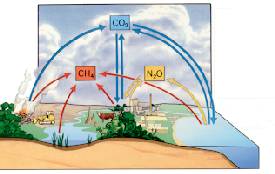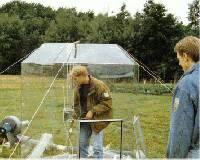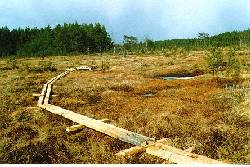RESEARCH
Background
One of the most important current environmental issues is the expected
irreversable impact of climate change on biospheric processes and human society.
Climate has a strong influence on many ecosystem processes like
plant-productivity, food-chain relations, species-competition, and exchange
of CO2 and other greenhouse gases between vegetation, soils and
the atmosphere.
Even slight changes in regional climate paramaters such as precipitation,
evaporation, and the occurrence of extreme events (storms, floods, drought)
will affect these processes with considerable environmental and socio-economic
consequences such as increased damage from erosion and other "natural disasters",
changes in crop-productivity, and spreading of diseases. Depending on the
rate of global change even the integrity and functioning of entire ecosystems
and landscapes may be threatened.
Many of the above mentioned problems are still not well understood, and unknown
feedback-mechanisms between climate and biosphere may cause surprises such
as a change in the balance between emission and fixation of greenhouse gases.
Important scientific challenges addressed by the CCB-research programme therefore
include the study of the feedbacks between the vegetation, land use and regional
climate in order to improve anticipating measures, especially with regard
to the implications of climate change for land use planning, ecosystem management
and the development of environmental policies.
Research Themes
Theme 1:
Role of land cover in regional
energy and water balance and biogeochemical cycles
Theme 2:
Formation and emission of Greenhouse
Gases and monitoring
Theme 3:
Effects on ecosystem functioning
and biodiversity
Theme 4:
Consequences for land use and
water management
Theme 5:
Mitigation and adaptation policies within the agro-production chain
Theme 6:
Socio-economic aspects and policy analysis
Theme 7:
Education and communication
The focus of this research theme is on fundamental processes operating
at the interface between land and atmosphere, especially through modelling
of processes related to the energy and water balance. Much of the research
is carried out as part of multi-national large scale experiments on
land-atmosphere exchange of water and heat in semi-arid and arid climates
such as the EFEDA and
HAPEX projects in central
Spain and the Sahel and the Large Scale Biosphere - Atmosphere Experiment
in Amazonia (LBA-experiment).
The common objective is to improve understanding of the vegetation atmosphere
interaction from local to regional scale (ie. up-scaling), as well as
facilitating down-scaling of results from Global Circulation Models (GCMs).
 This research theme concentrates on the changes in emission of greenhouse
gases (CO2,
CH4 and
N2O) resulting from land use changes
and agricultural
practice.
This research theme concentrates on the changes in emission of greenhouse
gases (CO2,
CH4 and
N2O) resulting from land use changes
and agricultural
practice.
CO2-research includes modelling
of the global carbon cycle, and changes in soil organic matter under changed
climatic conditions or after deforestation.
CH4-research
focusses on emission from rice-fields and peat grasslands (Methane & Rice). N2O
research studies factors influencing the emission of this greenhouse gas
from grasslands and cattle-farming. Upscaling of emissions from field plots
to regions of GCM grid cells is a major research aim.
 This research theme concentrates on the structure and dynamics of natural aquatic and
terrestrial ecosystems, both at the species and landscape level. To provide information
for nature management and conservation of biodiversity, research is focussed on climate-sensitivity
of key-processes like carbon and nitrogen cycling, succession, competition and distribution.
Ecosystems studied include forests, bogs and wetlands, rivers and streams. Species-research
ranges from studies on the effects of climate change and sea-level rise on migratory birds
to selection of bio-indicators and the development of a phenological monitoring network.
This research theme concentrates on the structure and dynamics of natural aquatic and
terrestrial ecosystems, both at the species and landscape level. To provide information
for nature management and conservation of biodiversity, research is focussed on climate-sensitivity
of key-processes like carbon and nitrogen cycling, succession, competition and distribution.
Ecosystems studied include forests, bogs and wetlands, rivers and streams. Species-research
ranges from studies on the effects of climate change and sea-level rise on migratory birds
to selection of bio-indicators and the development of a phenological monitoring network.
Some on-going projects:
Regeneration of Semiarid Plant Communities: The Role of El Niņo Southern Oscillation
and Herbivory Control
(Silviculture and Forestry Ecology Group, prof. Frits Mohren, dr. Milena Holmgren and ir. Hadewyn Post)
European Phenology Network (EPN)
De Natuurkalender
(Environmental Systems Analysis Group, ir. Arnold van Vliet)
 Emphasis of this research theme is on land use issues at the "macro level" such as land use
dynamics (world), food production, forestry, water management and physical planning.
Several studies focus on the incorporation of land use dynamics in integrated climate impact
assessment models such as IMAGE. Also,a dynamic framework to model regional land use dynamics
(CLUE) was developed.
Participartory methods with stakeholders are used in order to increase the capacity in
water resources management to cope with climate variability and change (Dialogue on Water and Climate). There are many links with the other themes: results
of research on the main driving forces (Themes 1, 2 and 6) and effects (Theme 3 and 4)
are used to develop mitigation-strategies and recommendations for changes in land use
planning and management.
Emphasis of this research theme is on land use issues at the "macro level" such as land use
dynamics (world), food production, forestry, water management and physical planning.
Several studies focus on the incorporation of land use dynamics in integrated climate impact
assessment models such as IMAGE. Also,a dynamic framework to model regional land use dynamics
(CLUE) was developed.
Participartory methods with stakeholders are used in order to increase the capacity in
water resources management to cope with climate variability and change (Dialogue on Water and Climate). There are many links with the other themes: results
of research on the main driving forces (Themes 1, 2 and 6) and effects (Theme 3 and 4)
are used to develop mitigation-strategies and recommendations for changes in land use
planning and management.
Some on-going projects:
The ATEAM project (Advanced Terrestrial Ecosystems Analysis and Modelling)
(Plant Production Systems Group (Wageningen University), prof. Rik Leemans)
Land-Use and Land-Cover Change Core Project office (LUCC)
(Soil Science Group (Wageningen University), prof. Tom Veldkamp)
Climate and development
A UNEP/RIVM project in which Plant Research International participates (Dr. A. Verhagen)
Global Peat Initiative
Plant Research International/Alterra (Dr. A. Verhagen/Dr. Henk Wosten)
5.Mitigation and Adaptation policies within the agro-production chain
|
|
With the growing world population, the pressure on land, the quest for food, water and
energy and the demand for all kinds of consumer goods will increase significantly.
Regarding the finiteness of our earth's reserves and the occurrence of the greenhouse
effect, attention for renewable resources (bio-energy) and the use of biotechnology
might help in order to secure our future. This research theme will focuss on the
agricultural and energy production chain. What are the climate impacts related to
the agricultural and energy production chain (energy use, greenhouse gas emissions)?
Is the production of green electricity, like bio-energy, economical profitable?
Integrated solutions are sought in order to minimalise other impacts of implemented
biotechnology measures. Identiefied solutions aims to reduce the risk of shifting of
the climate problem into other environmental problems or to other regions.
Some on-going projects:
An integrated approach of bio-energy chains
(ATO/IMAG/PRI/Alterra/ID-Lelystad/LEI-DLO, Dr. Wolter Elbersen, Dr. Bert Annevelink)
Energy from Biomass: multi functional land use and resource cascading as strategies
for cost reduction and optimal use of available land
(Environmental economics and natural resources, msc Ada Ignaciuk)
This theme focuses on socio-economic causes of climate change, such as consumer behaviour,
as well as technological and policy measures for preventing ((NOP-Impact) and mitigating rapid climate change,
for example through adjustments in recycling processes and re- or afforestation projects.
Both the direct effects of climate change, and the implementation of mitigation strategies
have considerable economic consequences. Scenario analysis, economic instruments
and participartory methods (COOL Project) are tested and used to provide decision-support
instruments for the development of national and international policies to deal with climate change.
Some on-going projects:
Baseline evaluation for the Clean Development Mechanism
(Environmental Economics and natural resources, Dr. Frank Voehringer)
An optimisation model for the analysis of the greenhouse effect: a regionalised worldmodel
(Environmental Economics and natural resources, Dr. Paul Mensink)
|
7. Education and Communication
|
|
The MSc, BSc and PHd education programmes within Environmental Sciences and Soil,Water and
Atmosphere provide practical and fundamental insight into the about interactions
between ecosystems and atmosphere, greenhouse gas emissions, climate change abatement
option analysies, carbon sinks, expert reviews and analysios of policy options and
socio-economic aspects. Specific attention is given to integrated and crosscutting
issues, such as relation between climate policy to biodiversity, water management and
food security. The expertise of the six themes is combined to seek for solutions and
answers to questions on global and climate change issues from politics and private sector.
 This research theme concentrates on the changes in emission of greenhouse
gases (CO2,
CH4 and
N2O) resulting from land use changes
and agricultural
practice.
This research theme concentrates on the changes in emission of greenhouse
gases (CO2,
CH4 and
N2O) resulting from land use changes
and agricultural
practice. This research theme concentrates on the structure and dynamics of natural aquatic and
terrestrial ecosystems, both at the species and landscape level. To provide information
for nature management and conservation of biodiversity, research is focussed on climate-sensitivity
of key-processes like carbon and nitrogen cycling, succession, competition and distribution.
Ecosystems studied include forests, bogs and wetlands, rivers and streams. Species-research
ranges from studies on the effects of climate change and sea-level rise on migratory birds
to selection of bio-indicators and the development of a phenological monitoring network.
This research theme concentrates on the structure and dynamics of natural aquatic and
terrestrial ecosystems, both at the species and landscape level. To provide information
for nature management and conservation of biodiversity, research is focussed on climate-sensitivity
of key-processes like carbon and nitrogen cycling, succession, competition and distribution.
Ecosystems studied include forests, bogs and wetlands, rivers and streams. Species-research
ranges from studies on the effects of climate change and sea-level rise on migratory birds
to selection of bio-indicators and the development of a phenological monitoring network.
 Emphasis of this research theme is on land use issues at the "macro level" such as land use
dynamics (world), food production, forestry, water management and physical planning.
Several studies focus on the incorporation of land use dynamics in integrated climate impact
assessment models such as IMAGE. Also,a dynamic framework to model regional land use dynamics
(
Emphasis of this research theme is on land use issues at the "macro level" such as land use
dynamics (world), food production, forestry, water management and physical planning.
Several studies focus on the incorporation of land use dynamics in integrated climate impact
assessment models such as IMAGE. Also,a dynamic framework to model regional land use dynamics
(